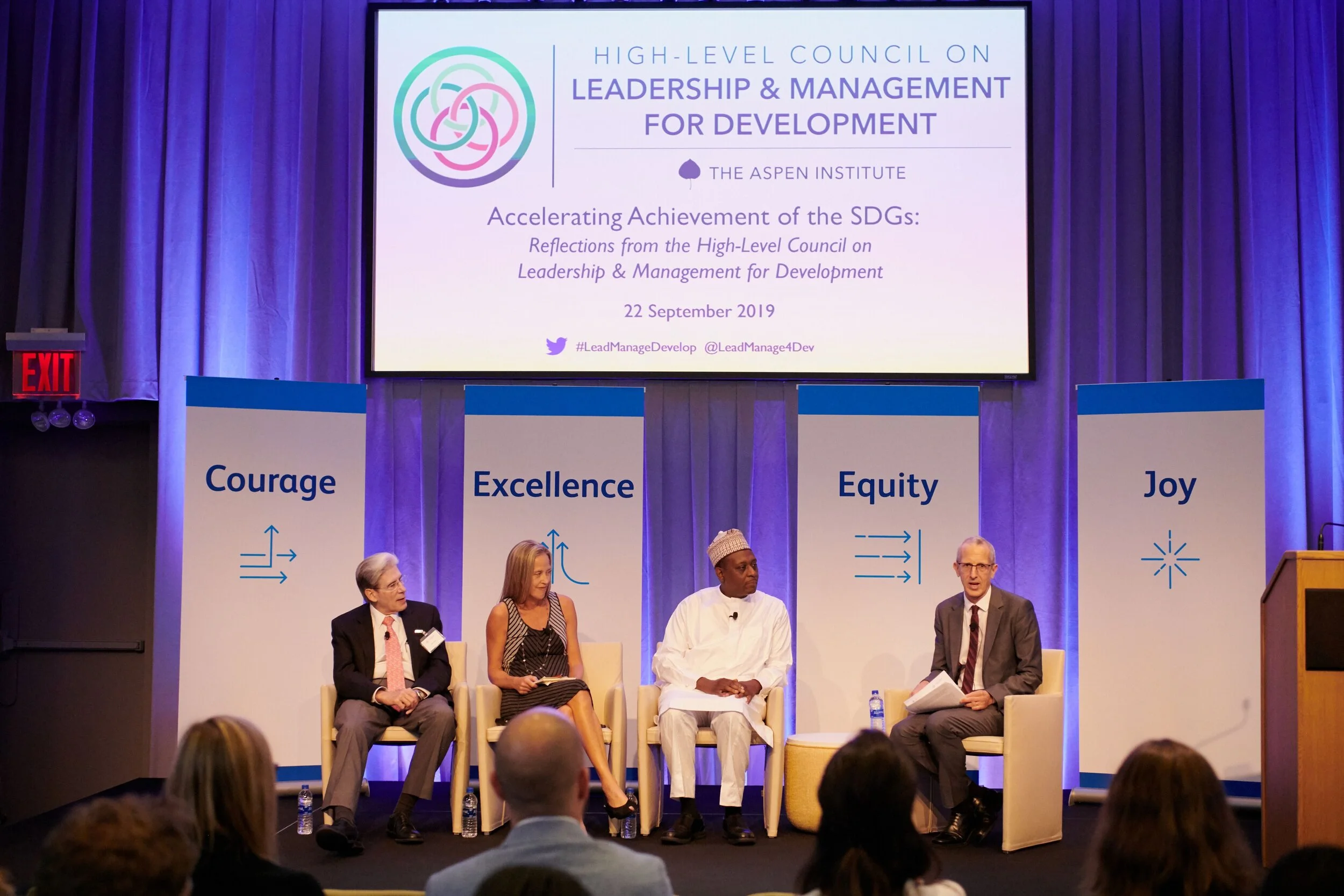[Washington D.C., 17 September 2024): Next week, the United Nations will convene the Summit of the Future, at which a Declaration on Future Generations will be tabled and discussed. The initial draft of this document acknowledges the complex and interrelated challenges and risks faced by present and future generations, lays out an ambitious list of obligations to those future generations, and clearly articulates that present generations carry a responsibility to act urgently to safeguard their needs and interests.
Yet delivering on these commitments will only be possible if we make substantial investments in the leadership and management skills of those who currently hold the fate of future generations in their hands, while also developing a comprehensive approach to developing those same skills in tomorrow’s leaders.
In November 2021, we, the High-Level Council on Leadership and Management for Development, a group of former heads of state, former ministers, and other leaders across diverse sectors and geographies, published a report entitled Investing in Public Sector Leadership and Management to Accelerate Sustainable Development. In it, we highlighted the need for visionary and effective public sector teams to guide government institutions and their partners as they navigate constant change and increasing complexity, and we called for a new approach to investing in leadership and management.
In addition, we noted that “to be effective in the 21st century, leaders need to develop new approaches to tackling the challenges they face and the opportunities that present themselves. They need to consider the novel context in which they find themselves and draw on acquired competencies – including leading through change, embracing ambiguity and uncertainty, constantly innovating, and engaging with multiple stakeholders. These skills are rarely taught in traditional leadership and management programmes, and when they are, the approach is often theoretical and abstract.”
We also suggested a path for developing next generation leaders, and for fostering a diverse pipeline of talent excited about entering public service. Young leaders bring fresh ideas, creativity, and innovative approaches with them. Investing in them ensures that the next generation has the skills to lead and manage effectively, and to be accountable to their commitments. Sustaining competent and vibrant institutions will require nurturing and sustaining human capital.
But none of this will happen without dedicated planning and resources. We need to take a systemic approach to cultivating leadership. Across society, including within the private sector, civil society organisations, and government institutions, leadership should be viewed as a set of skills that is practised at all levels and in all disciplines, with both junior and senior positions receiving leadership development support, as well as opportunities to apply and improve their abilities. We should also find ways of engaging with the education system to develop these skills. Work readiness programmes at educational institutions should focus on core leadership and management skills alongside the technical skills that they teach.
It is clear to us that these are precisely the sort of skills that will be required to deliver on the critically important and ambitious goals laid out in the Declaration on Future Generations. We believe that such efforts are likely to have myriad benefits, both direct and indirect, including increased quality of and access to public services; increased efficiency, especially in resource utilisation; increased ability to navigate change and complexity; accelerated innovation uptake; increased accountability; greater job satisfaction and talent retention in the civil service; and increased trust in government and government services.
We propose that in the Guiding Principles section of the declaration, a clause be added that states that “Leadership and management skills will be essential to deliver on these promises to future generations”.
In the Commitments section, we suggest that a clause be added that calls on countries to “Invest in the development of the next generation of public sector leaders and managers with a particular emphasis on mastering the complexity of current and future opportunities and challenges”.
At the conclusion of our Report, we reaffirmed our belief that investing in leadership and management skills would “pay tremendous dividends as teams of civil servants become more effective and efficient, which in turn will attract new talent to public service. With the right investment and the right partners, we can develop the civil service teams that can help us to navigate today’s challenges, seize new opportunities, and build a better tomorrow.” Four years later, we believe that this investment is more urgent than ever and is absolutely essential if we are to reach the Sustainable Development Goals and make the Declaration on Future Generations a reality.
Barbara Bush, Founder and Board Chair of Global Health Corps
Helen Clark, Chair of the Boards of the Extractive Industries Transparency Initiative and the Partnership for Maternal, Newborn, and Child Health; former Prime Minister of New Zealand
Julio Frenk, Chancellor Designate, University of California, Los Angeles; former President, University of Miami; Former Minister of Health of Mexico
Dan Glickman, former US Congressman; former US Secretary of Agriculture
Wendy Kopp, CEO & Co-Founder -- Teach for All
Robert Newman, Executive Director, AMP Health
Muhammad Pate – Coordinating Minister of Health and Social Welfare of Nigeria; former CEO of Big Win Philanthropy, former Global Director, Health, Population, and Nutrition, World Bank
Joy Phumaphi, Executive Director -- African Leaders Malaria Alliance; former Minister of Health of Botswana
Manuel Pulgar-Vidal, International Climate & Energy Global Leader -- WWF; former Minister of the Environment of Peru
Jaime Saavedra, Human Development Director, Latin America and the Caribbean -- World Bank; former Minister of Education of Peru
Ellen Johnson Sirleaf, Founder and Board Chair, Ellen Johnson Sirleaf Presidential Center for Women and Development; former President of Liberia


